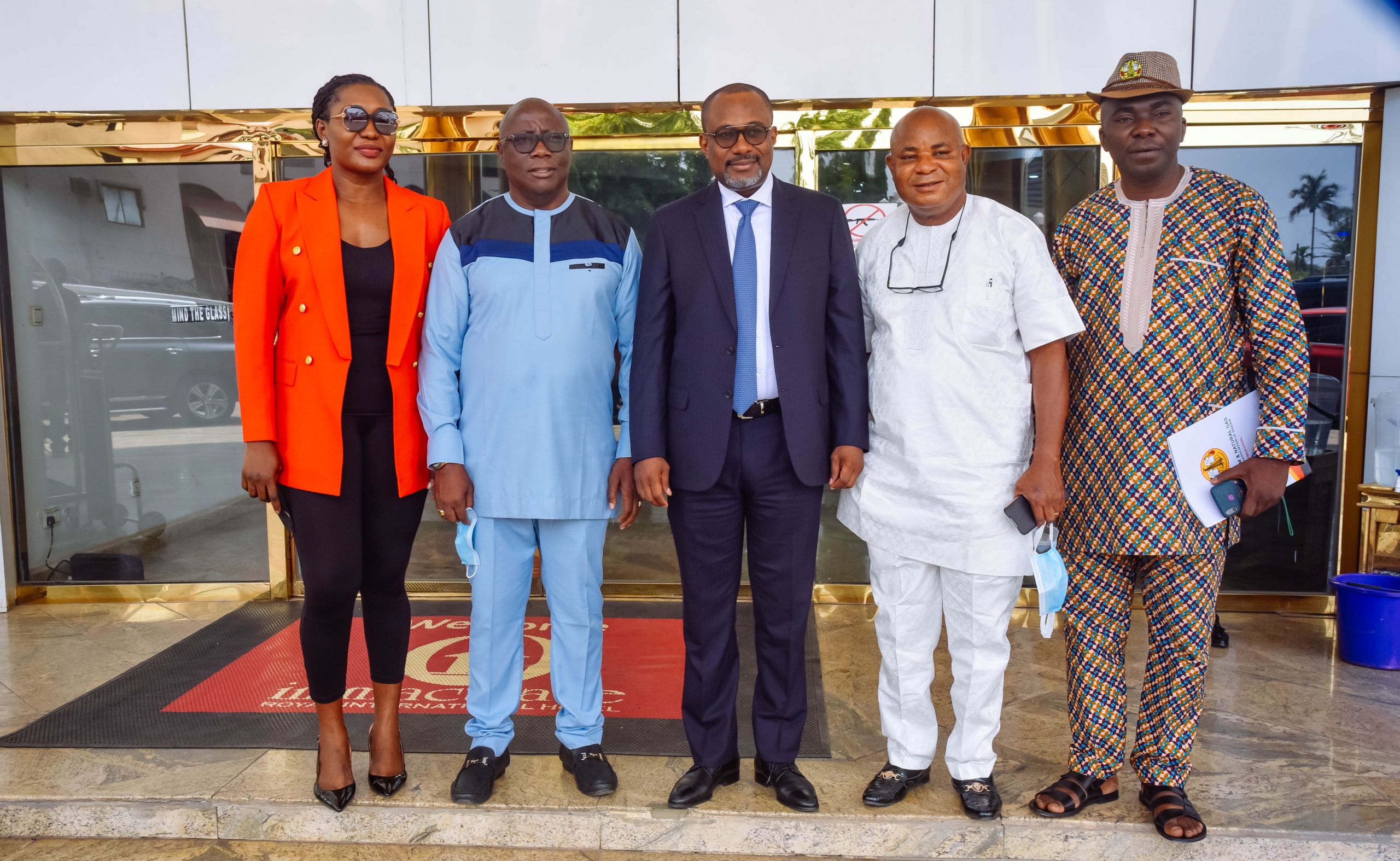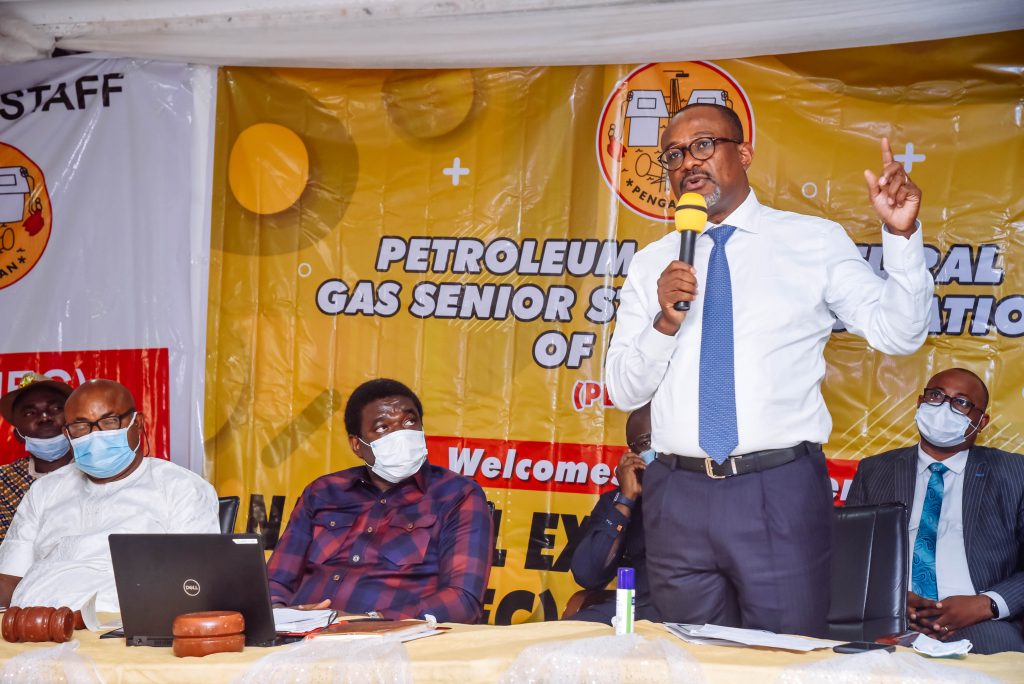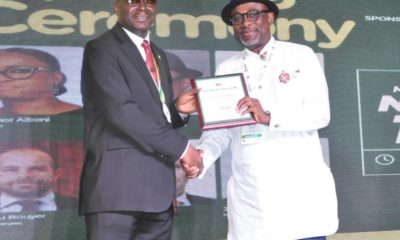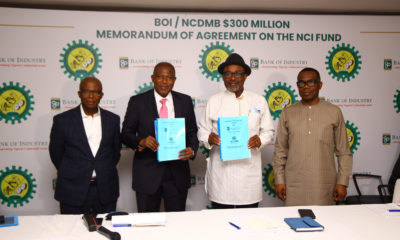Oil
NCDMB Boss Charges Oil Workers on 4th Industrial Revolution

Modupe ASUDO

Executive Secretary, Nigerian Content Development and Monitoring Board, Engr. Simbi Wabote dellivering a lecture at the PENGASSAN National Executive Council (NEC) Meeting in Owerri, Imo State, Southeast Nigeria recently
OWERRI-THE Executive Secretary of the Nigerian Content Development and Monitoring Board (NCDMB), Engr. Simbi Wabote has challenged oil and gas workers under the aegis of the Petroleum and Natural Gas Senior Staff Association of Nigeria (PENGASSAN) to brace up for the 4th Industrial Revolution that has brought Artificial Intelligence (AI), Internet of Things (IoT), Energy Transition, and other concepts into the oil and gas industry.
Engr. Wabote gave the charge recently while delivering a lecture at the PENGASSAN National Executive Council (NEC) Meeting in Owerri, the Imo State capital.
The Executive Secretary hinted that the switch to fully automated Floating Production Storage and Offloading (vessel) with zero manning on board and countries phasing out petrol driven cars were implications on the type and number of jobs that would be available and the skills sets that would be demanded. He urged the union leaders to organize strategic workshops and implement plans to transit their members into emerging job roles armed with necessary skill to fit into the emerging eco-system of the energy transition.
Engr. Wabote provided an overview of Nigeria’s hydrocarbon resource base and factors which gave rise to local content in the oil and gas industry and propelled the Federal Government to put in place the Nigerian Oil and Gas Industry Content Development (NOGICD) Act as part of our national economic development imperative.
He further highlighted key parameters of sustainable local content practice to include maximizing the utilization of Nigerian resources, maximizing the participation of Nigerians in oil and gas activities, attracting investments to the Nigerian oil and gas sector, and linking the oil and gas sector to other sectors of the economy.
He emphasized that the focus of Nigerian Content is not Nationalization of the oil and gas sector but Domiciliation of value adding activities, adding that local content development needs foreigners and Foreign Direct Investments to thrive.
“The Board has deployed these parameters in the oil and gas sector for sustainable local content practice through regulatory framework, R&D initiative, capacity building interventions, fiscal and monetary incentives as well as regular gap analysis to determine gaps that require closure with respect to skills, facilities, and infrastructure”, the Executive Secretary stated.
Describing the operations of the Board, he listed some of the achievements in the light of the 10-Year Strategic Roadmap aimed at achieving 70 percent Nigerian Content by 2027 from the current level of 35 percent in the oil and gas industry. The Local Content Chieftain concluded his presentation by enumerating the Board’s mandate to including developing capacity of local supply chain for effective and efficient delivery of the oil and gas industry, without compromising standards, and implementing and enforcing the provisions of the NOGICD Act 2010.
In his remarks, the National President of PENGASSAN, Comrade Festus Osifo disclosed that the gathering was to re-assess the implementation of the Association’s plans towards the improvement of the welfare of its members as well as furthering the growth of the union. He added that the meeting was also to review some of the interventions made by the union to ensure that government policies on the oil and gas industry benefit not only its members but also engender economic growth.
Comrade Osifo maintained that the meeting was a time to review its strategies, advocacy initiatives and approach of engagement to re-align them with the current realities even as it strives to protect its members and other Nigerians who may not have a platform to speak for them.
The union leader enumerated ongoing reforms and development within the industry that have far-reaching effects on stakeholders in which the association has made its position known while engagement is ongoing on others such as the Petroleum Industry Bill (PIB), Rehabilitation of Refineries, Casualization and Contract Staffing issues, Gas Utilization Plan, and the State of the Nation.
Oil
NNPC Targets 60% Methane Emission Reduction By 2031
The Nigerian National Petroleum Company Limited (NNPC) has unveiled a bold strategy to reduce methane emissions in the oil and gas sector by 60% by 2031, with an ultimate goal of achieving net-zero emissions by 2060.
This announcement reinforces Nigeria’s leadership role under the Global Methane Pledge initiative and its commitment to tackling climate change.
The Group Chief Executive Officer of NNPC, Mele Kyari, disclosed these plans during a meeting on Thursday with Robert Leahman, the U.S. State Department’s Global Methane Program Manager, and a delegation from Deloitte.
READ MORE: Atiku Gloats Over AUN’s Achievements Ahead Of 20th Anniversary
The discussions, held at the NNPC Towers in Abuja, focused on collaborative efforts to reduce methane emissions through innovative and sustainable practices.
“Reducing methane emissions is not just an environmental necessity but also a strategic imperative for Nigeria’s energy transition. We are leveraging partnerships to adopt global best practices and innovative solutions,” Kyari stated.
Key among these efforts is a pilot project in the Niger Delta, aimed at establishing emissions baselines, mitigating methane leaks, and promoting sustainable operations across Nigeria’s energy sector.
The project, a partnership between NNPC, Deloitte, and the U.S. Bureau of Energy Resources, will utilize data-driven methodologies to pinpoint and address methane hotspots.
Robert Leahman commended Nigeria’s proactive stance, describing it as a benchmark for other nations on the continent.
“Nigeria’s leadership under the Global Methane Pledge sets a standard for the continent. These initiatives will not only help reduce emissions but also drive sustainable development in the energy sector,” he said.
Kyari highlighted the broader benefits of addressing methane emissions, noting its significance for both environmental protection and economic efficiency.
“This collaboration is a game-changer. By addressing methane leaks, we’re reducing waste, saving costs, and protecting the environment. It’s a win-win for our economy and the planet,” he added.
Oil
FG Introduces New Incentives To Revitalize Nigeria’s Oil & Gas Industry
In a strategic move to revitalize Nigeria’s oil and gas sector, the Federal Government has unveiled two key fiscal incentives aimed at attracting investment and enhancing energy security.
The announcement was made by Mr. Wale Edun, the Minister of Finance and Coordinating Minister of the Economy on Wednesday.
The first initiative, the Value Added Tax (VAT) Modification Order 2024, introduces critical exemptions for essential energy products and infrastructure, including Diesel, Feed Gas, Liquefied Petroleum Gas (LPG), Compressed Natural Gas (CNG), Electric Vehicles, Liquefied Natural Gas (LNG) infrastructure, and Clean Cooking Equipment.
Read Also: Atiku Calls For Rotational Presidency Across Nigeria’s Geopolitical Zones
These exemptions are designed to reduce living costs for Nigerians, promote energy security, and accelerate the transition to cleaner energy alternatives.
The second initiative, the Notice of Tax Incentives for Deep Offshore Oil & Gas Production, offers new tax relief options for deep offshore exploration projects.
This measure aims to position Nigeria’s deep offshore basin as a premier destination for international oil and gas investments, boosting the country’s appeal to foreign investors.
These reforms are part of a broader set of policy initiatives, known as Policy Directives 40-42, endorsed by President Bola Ahmed Tinubu.
The directives reflect the administration’s commitment to fostering sustainable development in the energy sector and enhancing Nigeria’s competitive edge in the global oil and gas market.
Business
Tinubu set to approve ExxonMobil-Seplat oil deal, expands CNG bus initiative

By Yemie Adeoye
NIGERIA’s President Bola Tinubu has announced that the protracted ExxonMobil-Seplat upstream oil divestment will be formally approved by the Minister of petroleum within a matter of days, just as he announced his government’s intention to expand the Compress natural Gas, CNG buses initiative.
The President who stated this during his Independence day nationwide broadcast stated that the move is in line with his administration’s commitment to free enterprise, free entry and free exit in investments which is the hallmark of his administration investment policy.
“Fellow compatriots, our administration is committed to free enterprise, free entry, and free exit in investments while maintaining the sanctity and efficacy of our regulatory processes. This principle guides the divestment transactions in our upstream petroleum sector, where we are committed to changing the fortune positively. As such, the ExxonMobil Seplat divestment will receive ministerial approval in a matter of days, having been concluded by the regulator, NUPRC, in line with the Petroleum Industry Act, PIA. This was done in the same manner as other qualified divestments approved in the sector.”
The President also seized the opportunity to plead with Nigerians to be patient with his administration’s reform policies. “As your President, I assure you that we are committed to finding sustainable solutions to alleviate the suffering of our citizens. Once again, I plead for your patience as the reforms we are implementing show positive signs, and we are beginning to see light at the end of the tunnel”.
“Our energy transition programme is on course. We are expanding the adoption of the Presidential Initiative on Compressed Natural Gas for mass transit with private sector players. The Federal Government is ready to assist the thirty-six States and FCT in acquiring CNG buses for cheaper public transportation.
Fellow Nigerians, while we are working to stabilise the economy and secure the country, we also seek to foster national unity and build social harmony and cohesion. Our economy can only thrive when there is peace”. he enthused.

























